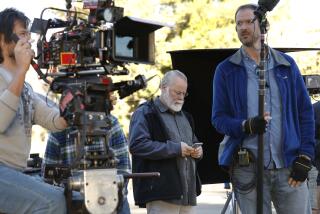BBC’s Los Angeles arm is growing strong
The scene had the feel of a slapstick British comedy: Wildly successful television executive trades her big job in London for a post in Los Angeles and frantically tries to put her company on the map while navigating the city’s maddening roads and culture.
“Coming out here, I would say that I was a highly functioning madwoman,” said Jane Tranter, head of BBC Worldwide Productions. “Suddenly I had to spend an awful lot of my day in cars: driving on the wrong side of the road, not knowing where I was going and getting lost. I couldn’t get used to the heat, so I would arrive [at meetings] sweating and covered in dust.”
But this was no folly. The veteran TV executive three years ago left her high-profile BBC role, where she was responsible for a $1-billion annual programming budget, to run the broadcaster’s U.S. production company. The L.A. unit produces “Dancing With the Stars” for ABC and the auto show “Top Gear,” which begins its third season Tuesday on the History channel.
Tranter’s primary objective is to remake BBC shows for U.S. audiences. She’s not the first. Norman Lear in the 1970s turned the BBC’s “Till Death Us Do Part” into CBS’ “All in the Family.” ABC later hit the jackpot with an American version of British network ITV’s “Who Wants to Be a Millionaire,” and Fox turned ITV’s “Pop Idol” into “American Idol,” television’s biggest hit. In 2006 “Dancing With the Stars” became ABC’s most popular program.
The gambit is paying off. BBC Worldwide Productions has put more than five shows on American channels, and it has eight others in production. Tranter’s group is creating original shows in collaboration with premium movie channel Starz. This summer, the companies plan to begin shooting “Da Vinci’s Demons,” an ambitious historical fantasy exploring the early life of Leonardo da Vinci, at an elaborate set in Wales built to resemble 15th century Italy.
But transporting a series is not easy. Humor, tone and relationships vary from culture to culture. Although some imports have been successful, including “Dancing With the Stars” and NBC’s “The Office,” the TV scrap heap is littered with failed attempts.
Tranter tried to tally all of the British shows that had been developed for U.S. networks. “I stopped counting when I got to 85,” she said.
There was a BBC sitcom about an Indian immigrant family in London, “The Kumars at No. 42,” that U.S. producers tried to recast as a comedy about Mexican Americans living in Van Nuys, with Cheech Marin as the patriarch. Six episodes of “The Ortegas” were shot, but Fox declined to air even one.
Soon after Tranter arrived in California, she realized her production company’s business model needed an overhaul. By targeting the big broadcast networks as primary buyers, her group was missing the mark. She uprooted her small staff from its offices in North Hollywood, near the network nerve center, and moved it into a brick building on Santa Monica Boulevard on the edge of Century City. Tranter wanted to be close to major cable channels, including Starz and HBO.
“One of the best ways to drive is against the tide of traffic,” Tranter said. “You can speed very quickly and everyone thinks you are going the wrong way. But going against the trend will get you to the trend.”
Retooling the long-running BBC hit “Top Gear” was a high-stakes proposition, and creating an American version took care.
Nancy Dubuc, general manager of History and Lifetime Networks, said she had to lobby Tranter to place the show on History. “This was one of the BBC’s top programming assets,” Dubuc said. “When you have a baby as delicate as that, you have to walk a fine line.”
Indeed. Tranter said that when she was preparing to move to California, Mark Thompson, director-general of the BBC, told her to do her best, but to avoid messing up “Top Gear.”
Last fall, viewership for “Top Gear” accelerated 36% above its inaugural season with an average of 1.9 million viewers per episode. The show has attracted young male viewers whom advertisers pay a premium to reach. It has become History’s youngest-skewing show in its history.
“This show is about the special communication that guys have with each other and their love of their cars,” Dubuc said. “And it’s been nice for two chicks to do something that guys love to do.”
In the last three years, Tranter’s BBC Worldwide Productions has tripled in size to more than 35 full-time workers. When “Dancing With the Stars” is in production — its 14th season begins March 19 — the staff swells into the hundreds.
The BBC agreed in late 2010 to gradually reduce its reliance on the mandatory TV license fee that Britain’s residents must pay — which last year brought in $5 billion. Those fees have long funded the broadcaster’s programming. To diversify its revenue, the BBC began looking to BBC Worldwide to more rapidly expand its business by adapting its shows for international audiences, among other initiatives.
“Now it must grow its income abroad as never before — with even greater determination,” said Claire Enders of Enders Analysis in London. “And the U.S. is the biggest television market in the world. That’s where the money is.”
Tranter declined to break out profits for her group. But BBC Worldwide, the company’s commercial arm to which Tranter’s group contributes, showed revenue increasing to $1.8 billion in its 2010-11 fiscal year, up 8% from a year earlier. Its profit rose 10% to $252 million.
Developing the U.S. market has been a priority. The company also is mulling a “Doctor Who” feature film that could catapult the BBC’s long-running TV science fiction franchise to even greater heights. When she ran programming in Britain, Tranter was responsible for the TV version. She declined to discuss the movie project.
“They are the only company from outside of the U.S. that has turned themselves into a full-fledged U.S.-based production company,” said Chris Albrecht, chief executive of Starz, owned by Liberty Media Corp. Starz scored with the BBC Worldwide’s “Torchwood: Miracle Day,” which led to the programming partnership struck last summer.
Now entering her fourth year in the U.S., Tranter said she’s accomplished her goals of establishing a toehold in Hollywood and improving the creativity of the shows.
“We are here and we are flourishing,” she said.







